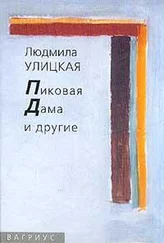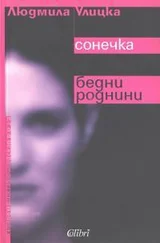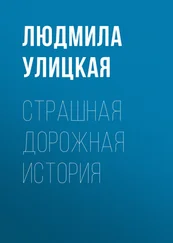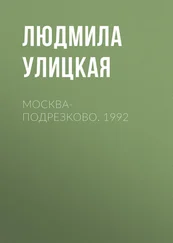When all the documents had been collected, Debora Lvovna categorically refused to go but did give permission for them to emigrate. The exit permits were finally issued, only for Butonov to announce himself again. It happened one morning. Masha got Little Alik ready, took him over to Alexandra, and went to Rastorguevo to say goodbye.
It was a good leave-taking. Masha told Butonov this was the last time he would see her, that she would soon be leaving forever, and she wanted to take every last detail with her in memory. Butonov was agitated: “Forever? Well, of course, you’re right, Masha, quite right. Life here is crap compared to the West, I’ve seen that. But forever . . .”
Masha walked through the house memorizing it all, because she wanted to retain the house in her memory too. Then the two of them went up to the attic. It was as dusty and cluttered as ever. Butonov tripped over the knocked-out seat of a bentwood chair, and picked it up: “Look.”
The center of the seat was pierced through with knife throws, and marks from near misses were all around it. He hung the seat up on a nail.
“This was the main thing I did as a boy.”
He took out a knife, went off to the far end of the attic, and threw it. The blade stuck in the wall right through the middle of the punched-out circle.
Masha pulled the knife out of the wall and went over to Butonov. He thought she wanted to throw it at the target too, but she only weighed it in her hand and gave it back to him.
“Now I know everything about you.”
After that trip Masha began quietly preparing to emigrate. She took all her papers out of the writing-desk drawers and decided what to keep and what to throw away.
The customs officials did not allow manuscripts to be taken out of the country, but Alik knew someone in the embassy, and he promised to send Masha’s papers out through the diplomatic bag. She sat on the floor surrounded by them, rereading every page, pondering each one, and feeling sad. She could suddenly see that everything she had written was only a draft for what she wanted to write, now or some time in the future.
“I’ll compile a collection and call it Insomnia .”
The poems came out to her like wild animals coming out of the forest, complete but invariably with a defect of some kind, a limp in the foreleg, a limp in the first verse.
There is clairvoyance in the nighttime,
all detail hidden by the dark;
of stripes on walls it’s only white ones
that on the paper show their mark.
The baggage that I bear at nighttime,
the cares and trivia fall away:
the brilliant genius of nighttime
by far outshines the light of day.
I have come to love insomnia,
the crystal vistas of the deep:
their gift, a delicate deposit,
dispels all likelihood of sleep.
Masha grew very thin, becoming even more fragile, and the daytime world, which seemed to her so dull in comparison with the world of night, became more fragile too. An angel appeared. At first she could not actually see him but sensed his presence, and sometimes turned around quickly because she thought she might glimpse him that way. When he came to her in a dream, his features were clearer, and the part of the dream in which he appeared was like a color sequence inserted in a black and white film.
He looked slightly different each time and could assume human form: one time he appeared to her in the form of a teacher dressed in white like a fencing instructor, and started teaching her to fly. They were standing on the slope of a living, softly breathing hill, which was also taking an ill-defined part in the lesson.
The teacher indicated a region of the spine to her, below the level of the shoulders and deeper, where a small organ or muscle was located, and Masha knew that she would fly just as soon as she learned the gentle, precise movement which controlled this organ. She concentrated, and it was as if she had pressed a button: her body began very slowly to break free from the mountain, and the mountain gently helped her with the movement. Masha flew clumsily and slowly, but it was already entirely clear to her what she had to do to control the speed and direction of her flight—to wherever she wanted to go and for as long as she wanted to fly.
She raised her head and saw that the translucent people flying above her were strong and free, and she understood that she too could fly in just the same way. Then she slowly came back down, without having tried out all the possible delights.
This flying was not at all like the flight of birds: there was no flapping of wings, no fluttering, no aerodynamics, just an effort of the spirit.
Another time the angel taught her the techniques of a special verbal intellectual wrestling which does not exist in our world. It was as if you had a word in your hand which was a weapon. He put it in her hand, smooth and comfortable in her palm. He turned her hand, and a sharp ray of meaning glinted out of it. Immediately two opponents appeared, one to the right and above her and the second to the left and slightly below her. Both of them were practiced and dangerous enemies, skilled in this martial art. One glinted at her, and she gave a riposte. The second came in close and directed a quick blow at her, but in some miraculous way she managed to deflect it.
There was a razor-sharp dialogue in these attacks, untranslatable but completely clear in its meaning. Both combatants were ridiculing her, pointing out to her how inferior she was and how hopeless her attempts were to compete with their mastery.
To her growing amazement, however, she deflected every blow and with each new movement discovered that the weapon she held was becoming more intelligent and accurate, and that this combat really did seem closest to the art of fencing. The opponent to the right was more vicious and sarcastic, but retreated. Then the second one backed off too. They were gone, and that meant she had won.
Sobbing openly, she threw herself on her teacher’s breast. He said, “Don’t be afraid. You have seen, nobody can harm us.”
Masha cried even more bitterly because of the terrible weakness which was truly her own, because all the intellectual power with which she had prevailed had not been her own but lent to her by her teacher.
Masha experienced a superhuman freedom and an unearthly joy from this new experience, which came from regions and spaces the angel had revealed to her; but for all the novelty and unimaginableness of what was happening, she intuited that the extremes of pleasure she experienced when she was closest to Butonov derived from the same root and were of the same nature. She wanted to ask the angel about this but he did not let her: when he appeared, she subjected herself to his will eagerly and diligently.
When he disappeared, however, sometimes for several days, she felt very low, as if the joy of his presence had inescapably to be paid for by depression, gloom, emptiness, and miserable monologues addressed to the almost nonexistent Butonov: “So dazzling, the light of Tabor daunts us, but far harder to gaze upon the disk whose empty blackness taunts us through all the following days.”
Masha hesitated over whether to tell Alik about this. She was afraid that, ever the rationalist, he would view the matter in a medical rather than a mystical light. In her case, however, the realm of poetry lay between medicine and mysticism, and there she was the ruler.
She decided to approach him from that direction. Late one evening when the whole house was asleep, she began reading him her latest poems:
“I noticed how, angelic guardian,
your powers were looking after me,
Читать дальше




![Людмила Улицкая - Сквозная линия [litres]](/books/393468/lyudmila-ulickaya-skvoznaya-liniya-litres-thumb.webp)





